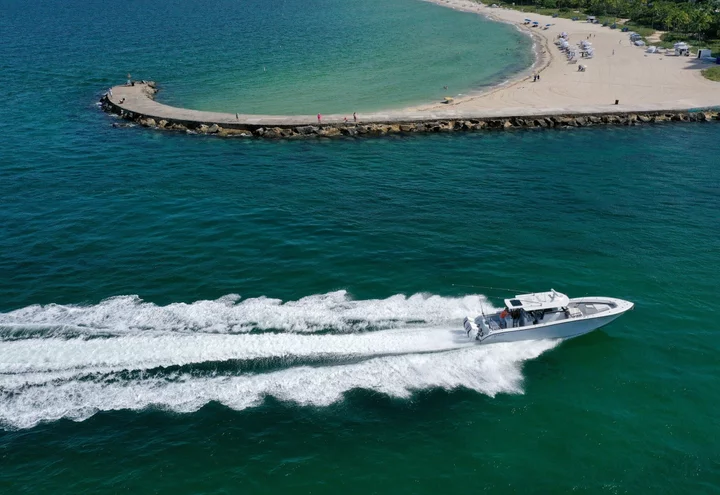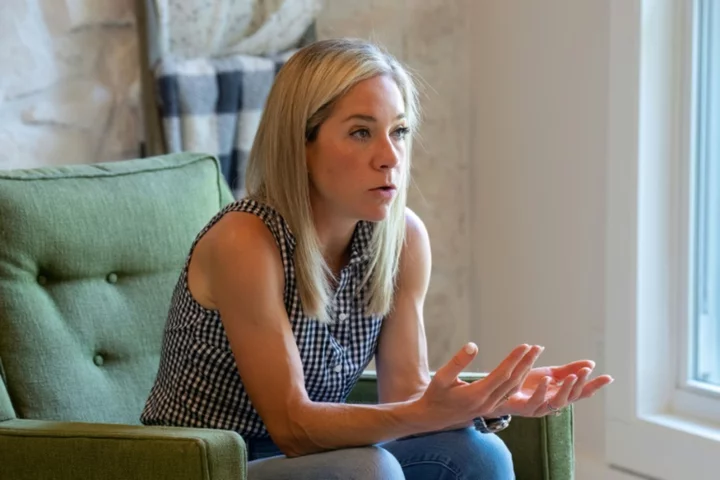Tourism has bounced back furiously in the world’s major tourism markets. Spain recovered 86% of its pre-pandemic tourist arrivals in 2022, and arrivals this year already show a 28% increase over 2019 levels. France follows closely with year-to-date international visitors numbering just 3% less than before the Covid-19 pandemic and their spending at record levels, according to Atout France, a government tourism agency.
The US, on the other hand, is falling behind.
International tourist arrivals remain at 26% below pre-pandemic levels, according to a June 2023 monthly report from the US Travel Association, with spending slower, too. At the close of 2022, international visitor spending in the US was at $99 billion, just over 50% of where it stood in 2019. That’s a far cry from 2019, when the US received 79.4 million visitors, who spent $181 billion.
“The lag is very significant, and we are very concerned,” says Geoff Freeman, US Travel’s chief executive officer. “We estimate that this year alone we’re going to lose about 2.6 million international visitors and $7 billion less in spending.”
The US travel industry isn’t expected to recover to 2019 levels until 2025. Those two additional years will translate into “billions of dollars of lost spending, of lost jobs,” says Freeman.
For the first time in history, the US is also running a multiyear travel deficit: Americans are spending more money abroad on their travels than international tourists are spending in the US.
Bureaucracy and delays
The State Department’s US visa processing delays continue at the top of the obstacle list. As of early July, visa wait times remained above 400 days for first-time applicants from top markets that do not qualify for visa waivers, according to US Travel. In 2019, travelers requiring visas to enter the US made up 43% of all inbound international travel.
“Our wait times are completely unacceptable, and they are discouraging travelers from coming here,” says Freeman. The government has been willing to acknowledge the problem, he adds, and improvements have been made with applicants from India and Brazil.
A State Department spokesperson said in an emailed statement that the agency was “quickly lowering visitor visa interview wait times worldwide. In the first nine months of fiscal year 2023 (through June 2023), globally we issued 19.4% more nonimmigrant visas than we did during the same period in fiscal year 2019.”
The median global interview appointment waiting time for visitor visas as of July 1 was approximately three months, down about a third from 120 days in October, said the spokesperson, who added that additional officers heading overseas should match the State Department’s global pre-pandemic staffing by the end of 2023.
Meanwhile, destination rivals including Canada, the UK and the EU are growing more aggressive in soliciting tourism and making themselves more accessible to such top US markets as Mexico, Brazil, Colombia, Argentina, Israel and Venezuela. Citizens from those countries can travel visa-free to the EU, for instance, while the UK has waived visa requirements for Colombia and Peru, among others.
Beyond waiting times for visas, US travel industry woes include hotel rates that have remained high since travel recommenced. Those prices are deterring international travelers who are concerned with high travel costs, a strong dollar and inflation; hotel demand in the US dipped 2% in May 2023, data from US Travel shows.
Travelers are also dealing with delays getting through customs at airports and TSA wait times continue to increase. Bloomberg reached out to US Customs and Border Protection but did not receive a response in time for publication.
“On and on, across the board, we demonstrate that we don’t prioritize travel the way that other markets do,” says US Travel’s Freeman. “It is something that we have taken for granted here in the US for too long.”
In addition to leisure tourists, business travelers are being deterred by bureaucracy. Trade show exhibitors confirm that attendance is down 20%, says Freeman, attributing the reduction directly to a paucity of foreign visitors. Travelers from Japan and from China, two of America’s top markets for incoming visits, have been slow to return to the US—with respective numbers currently at just 37% and 37% of 2019 levels.
A political reality
Domestic tourism remains the bright spot—leisure trips for Americans in the first half of 2023 showed a 3% increase over 2019 levels and are projected to settle at those levels this year. Still, the US appears to face a larger reckoning that’s affecting decisions by both domestic business visitors and international tourists.
“There is a growing perception outside the USA that the country is no longer safe,” said Jack Ezon, founder of luxury boutique firm Embark Beyond, in his second-quarter Travel Trends Report. Higher crime rates, homelessness in cities and news of mass shootings are scaring potential visitors, the report adds.
The report further states that Ezon’s clients come “with a litany of restrictions removing places like Florida, Texas and Tennessee (among others) based on their draconian anti-LGBTQ or anti-abortion legislation. Others asking not to be exposed to destinations that are too ‘liberal.’ Both are something we’ve not ever seen before.”
Stacy Ritter, CEO at Visit Lauderdale, which promotes tourism in the south of Florida from Miami-Dade to Palm Beach counties, echoes concerns that politics are impacting decisions to book events in her destination.
From May to July this year, Visit Lauderdale received 10 cancellations for late 2023, 2024 and 2026 of group business events ranging in size from 500 to more than 10,000 attendees. The cancellations have already caused a loss of more than 15,000 room night bookings, the agency says.
“This is the first time I’ve seen a grouping in such a short period of time for political reasons. That’s in excess of a $20 million economic impact,” says Ritter.
The Rivals conference, from radio personality Tom Joyner, celebrates students and alumni from historically Black colleges and universities. Set to take place in Fort Lauderdale this year, it was canceled on July 7. It would have brought 10,000 attendees over the three-day Labor Day weekend holiday to Broward County, Ritter says. The Chicago-based American Specialty Toy Retail Association was planning an event in Fort Lauderdale in 2026 but reconsidered, citing the “unfriendly political environment in Florida.” The group is now considering Milwaukee.
Because event bookings require more lead time, they are difficult to reschedule, so a slowdown now can wield a far greater impact later.
“We now know that there are meeting and conference planners which aren’t even sending requests for proposals to any of us in Florida,” says Ritter, noting that cancellations began trickling in during April 2022, after passage in Florida of the first so-called Don’t Say Gay law.
Exact words from meeting planners for Humana, the Society for Maternal Fetal Medicine and American Crafts Spirits Association, she says, were: “Florida is out now due to politics” or “Florida is off the table right now due to policies.”
For South Florida tourism at least, she says, “it’s more a question of what are we not even able to bid for that we would normally have had an opportunity to bid for? I can’t even quantify that.” The setbacks come amid a more than $1.5 billion convention center expansion project that’s underway.
Visit Orlando has suffered a similar round of cancelled meetings, CEO Casandra Matej confirmed in a recent report.
Jeremy Redfern, press secretary at the office of Governor Ron DeSantis, brushed aside such concerns. In an emailed statement to Bloomberg, he said that, “as Governor DeSantis announced in May, Florida is experiencing record tourism, with Q1 2023 having the largest volume of visitors during a single quarter in recorded history.”
Redfern pointed to a recent report that Florida is one of six fast-growing Southern states contributing more to the national gross domestic product than the Northeast, and cited a July 2023 CNBC ranking of the Sunshine State as the nation’s best component economy.
For US Travel’s Freeman, the sluggish recovery of US travel has more to do with inefficiency than with politics.
“I’ve heard the politics comments for a long time, going back to the George W. Bush administration,” he says. “But the US is still the most desired nation to visit, so you have to ask yourself: If they want to come, why aren’t they coming? And I think that’s a lot less about politics and it is a lot more about obstacles that are being put people’s way.”









